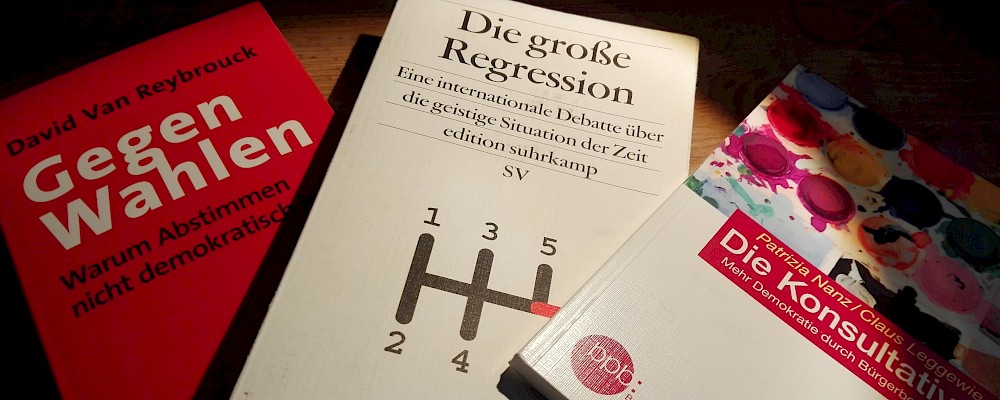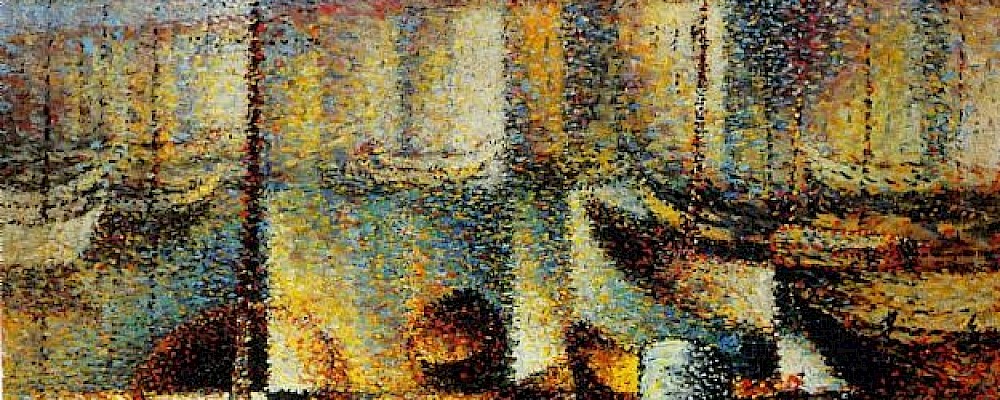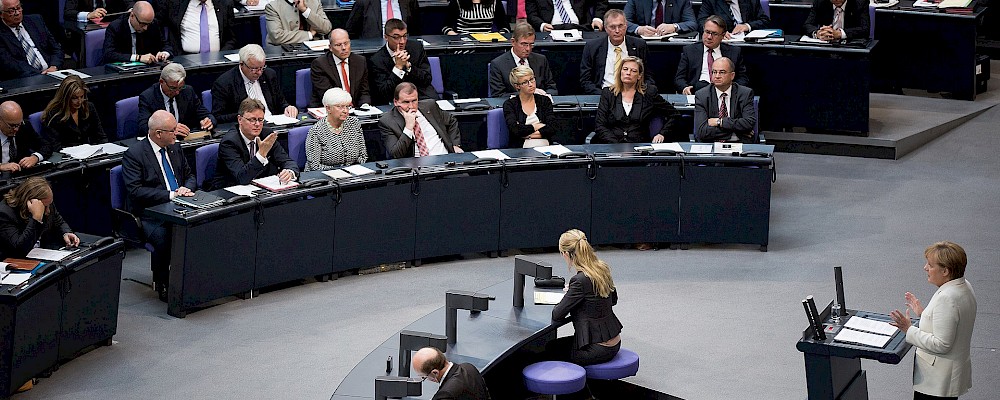Drawing Lots as a Solution to the Crisis of modern Democracy?
European democracies are faced by the rise of right-wing populism, plummeting turnout figures and growing exasperation with the EU. These Trends are occurring in the background of a lack of institutional power and representing a profound crisis of democracy. Could the situation be improved by a lot procedure?

David van Reybrouck starts his essay for the Great Regression by addressing President of the European Commission Jean-Claude Junker. Based on a loss of confidence in the European establishment, he warns against the dissolution of the EU. He questions the means of current citizens’ participation, demanding a reform which empowers the people for democratic participation. According to Reybrouck, elections release the citizens from active participation. Denying the positive effects of elections when confronted with political discourses, Reybrouck stresses that even historically elections were not implemented to empower citizens, but to create a natural form of aristocracy. In his opinion, referendums reduce difficult questions to simple Yes/No questions. In addition, administrations often connect their political future to the result of a referendum, ballots thereby often become ballots on the current administration as well. Brexit or the American presidential elections illustrate these crucial deficits. Europe in particular is facing a ‘fatigue of democracy’ (e.g. low turnout or resigning of membership of political parties). Reybrouck stresses the cleavage between those who feel represented and those who do not.
Lottery?
Using the central element of democracy in ancient Greece and the Italian Renaissance, Reybrouck proposes lottery as a solution. Unlike elections a procedure of drawing lots does not force all citizens to decide on topics they are not familiar with. Rather, a randomly picked part of the population informs itself and makes a reasonable decision. Furthermore, choosing at random may achieve a necessary politicization. However, aiming at the EU, Reybrouck suggests the following: Every country in the EU draws lots to determine 100 citizens from their countries. The selected citizens face the question “how can the EU be more democratic until 2020?”. The resulting proposals should be implemented by a multiple-choice referendum where the total population can choose 3 of 25 proposed answers. This could be part of the solution for greater participation.
House of Lots
Lottery has strong positive effects on consent and informed opinion, a major research study by James Fishkin has shown. Different projects have started to popularise this idea of deliberative participation.When focussing on interesting projects, one must mention Burgerforum Kiesstelsel and the “Convention on the constitution” in Ireland. The latter worked on new constitutional articles, the former tried to reform a local election system. There are ideas about long-term legislative lot-based institutions. Emphasizing five specific models, Reybrouck presents, among others, the proposal of Anthony Barnett and Peter Carty. Targeting the British House of Lords, they want to create a house of peer(s), whose members are determined by lottery. Measures should be taken to ensure that the house of peer is provided with expertise and financial support to be able to provide a proper decision regarding usefulness and constitutionality of new legislative proposals. Prof. Hubertus Buchstein submitted a similar proposal for the EU. He wants to create a new second chamber by designating members proportional to every country by lot, - the house of lots. As in the first model, the members would get financial and thematical support. However, house of lots ought to be equipped with the rights of initiative, advice and veto, thereby challenging the European democratic deficit.
Future Councils
The Consultative is the name of a book published by Patrizia Nanz and Claus Leggewie concerning lottery as well. Focusing on the local level they develop a concept concerned with future councils. As a permanent institution, they shall consult a community or district, working up solutions in a long-term/future-oriented manner. Reflecting the socio-economic /demographic characteristics of the population, 20 people will be selected by lot for two years (while receiving an allowance to cover their costs). Also, the members receive all relevant information, avoiding at the same time the formation of experts’ councils. Furthermore, this so called “qualified selection” improves generational justice. This concept is challenging the problem that ‘general’ politics is often focused on the next election and thus blind for long-term reforms/problems. The possibility of networking the councils at a European level is completely in accordance with the motto: “all politics is local and has global effects”. The aim of a council of future is the consultation via decentralised reasoning of citizens; protecting a certain efficiency, democratic-representative bodies have to be fully accountable to this council. This also means that they are obliged to justify their decision if they refuse a suggestion (there are examples of successful institutionalization).In a case where significant impacts on the population exist, a popular vote can be used.
Which one to prefer?
The answer depends on the objective of this ‘democratic extension’. In my opinion, reforms concerning urgent content-related topics should be prioritised. Thereby, one of the biggest deficits of democracy, that is, political parties making decisions depending on their future share of votes, is challenged. Representative-democratic bodies, however, can solve their daily operations in a good way, furthermore, a whole chamber selected by lot faces the possibility to become overloaded by day-to-day politics and lose sight of the bigger picture (In addition, serious wrongdoing should be blocked by check-and-balances). However, a certain degree of institutionalisation and continuity is necessary in order to improve and accompany reforms, considering the fact that even the best concept fails sometimes if its confronted with the reality (e.g. development cooperation). This suggests that ‘future councils’ may be the best and maybe most realistic concept. Eventually, a final evaluation can certainly only be given after implementation (that there is not enough potential influence is conceivable).
Reybrouck, David van: "Against Elections: The Case for Democracy." Bodley 2017. 208 pages. 8,99 €
Nanz, Patrizia & Leggewie, Claus: "Die Konsultative." Wagenbach 2016. 112 pages. 9,90 €
More articles by this author

Ein Strohmann geht um in Europa: Pauschalkritik an postkolonialem Denken als Tragödie und Farce
Niko Gäbs Polemik „Critical Highness“ weist darauf hin, dass es im postkolonialen Diskurs Leerstellen in Bezug auf Antisemitismus gibt. Dies zeigt nicht zuletzt die Debatte um den postkolonialen Theoretiker Achille Mbembe (Cheema/Mendel 2020). Auch Edward Said, Koryphäe der postkolonialen Theorie, steht im Verdacht „die Grundlagen eines sich postkolonial gerierenden Antisemitismus“ (Salzborn 2018, 124) zu formulieren. Nichtsdestotrotz liegen Gäbs Text einige Missverständnisse zugrunde, die wir im Rückgriff auf postkoloniale Theorien und neuere theoretische Entwicklungen erhellen wollen.

(Philosophische) Diskussion um Corona: Timeline Februar-April
In diesem Beitrag tragen wir eine Auswahl der zahlreichen Beiträge der philosophischen und soziologischen Diskussion zu und um das Coronavirus zusammen und liefern teilweise eine kurze Zusammenfassung der Beiträge. Wir vollziehen dabei den Gang der Kontroverse vor allem (aber nicht nur) anhand der Debatte nach, die sich ausgehend von dem Beitrag “The Invention of an Epidemic” des italienischen Philosophen Giorgio Agamben entwickelt hat.

F(EU)TURE FESTIVAL
The F(EU)TURE FESTIVAL took place from 1 to 16 of March 2019. Together with CLB Berlin, the European Democracy Lab turned Moritzplatz into a place breathing the European spirit as it is aptly called on the festival’s website. Together with activists, researchers, artists, intellectuals and a large number of visitors from all sectors of society, the state and future of European democracy were discussed. Our authors were on the spot and will go into some of the events below.
More articles in this category

Ist das Licht wirklich erloschen?
In ihrer politischen Analyse „Das Licht, das erlosch. Eine Abrechnung“ thematisieren die Autoren Ivan Krastev, bulgarischer Politologe, und Stephen Holmes, US-amerikanischer Professor für Rechtswissenschaften, den Aufschwung des demokratischen Liberalismus, der unmittelbar nach dem Zusammenbruch der Sowjetunion und dem Untergang der kommunistischen Ideologie Ende der 1980er Jahre in Ost- und Mitteleuropa Einzug hielt. Drei Jahrzehnte nach der politischen Wende folgte auf anfängliche Euphorie die Ernüchterung: Dort wo einst Überzeugung und Begeisterung für das westeuropäische demokratische Modell herrschte, kehrten Enttäuschung, Populismus und antiliberalen Revolte ein.

Bruno Latours Ausrufung des Kriegszustandes. Geopolitik, Klimabewegung, Utopie und der Kampf um Gaia - ein Kommentar.
"Facing Gaia" (dt. „Kampf um Gaia“) geht auf die "Gifford-Lectures" zurück, die der französische Soziologe Bruno Latour 2013 an der University of Edinburgh hielt. Darin plädiert er dafür, anzuerkennen, dass wir unter einem neuen Klimaregime leben, welches es notwendig mache, erneut geopolitisch zu denken.

Krisenhafte Demokratisierung: Philip Manows zweite politische Analyse erklärt die „(Ent-) demokratisierung der Demokratie“
Vor zwei Jahre erschien Philip Manows originelle Analyse des (nach wie vor aktuellen) Populismusphänomens. Mit seinem neuen Buch „(Ent-)demokratisierung der Demokratie“ ist ihm wiedermal eine differenzierte Deutung der politischen Gegenwart gelungen, die gewohnte Perspektiven verkehrt und sich von überkommenen Hypothesen abwendet.